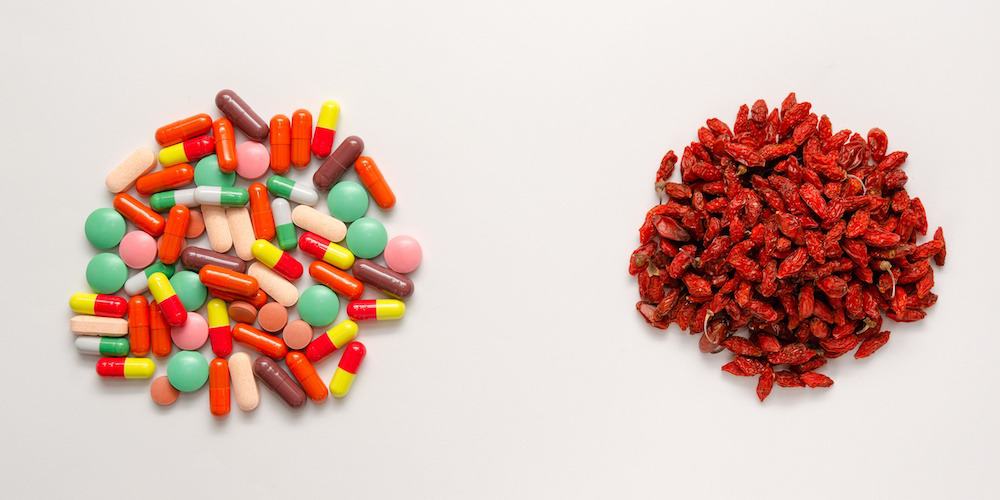Controversies surrounding goji berries
Goji berries are not a dangerous food: after all, they have been eaten for millennia in Asia, where they originate. However, the craze around these small red berries in the West has led to certain excesses. They can be eaten safely, provided they are chosen properly and not credited with miraculous properties.
The benefits of goji berries
The ultimate superfruit, “longevity berry”, “smile fruit”, “fruit of eternal youth”… Nicknames abound for the goji berry. This small fruit is part of traditional Chinese medicine, where it is used as a tonic and to boost the immune system.

Goji berries are indeed rich in fiber, antioxidants, vitamin C and calcium, making them an ideal food to fight fatigue, protect cells from aging and maintain good eyesight.
Some also use it as an appetite suppressant in the context of a diet. While some of these properties are proven, others are rather fanciful or, in any case, have never been scientifically established: anti-cancer, anti-diabetes, anti-cholesterol…
Are goji berries just another red fruit?
Goji berries are therefore indeed a small food rich in vitamins and nutrients, but not more so than the small red fruits found locally. For example, blackberries are very rich in antioxidants and vitamin C, which can be found (for free!) in our countryside.
Strawberries and raspberries are also red fruits that are excellent for health. Blueberries help protect eyesight, and prunes are as rich in fiber as goji berries. As for the top spot for antioxidant content, it goes… to blueberries!

Goji berries are therefore not essential to our diet. All the more so because marketers have ridden the wave of superfoods and often sell them at exorbitant prices. However, if you enjoy their slightly tart flavor, you can certainly eat them, provided you choose them carefully.
How to choose goji berries
It’s important not to rush into buying just any goji berries. Indeed, some of them can contain pesticide residues in significant amounts.
Goji berries high in pesticides
In 2018, an investigation by the magazine Test Achats, the Belgian equivalent of 60 Millions de Consommateurs, revealed that many packets of goji berries sold in Belgium contained pesticide residues (10 out of the 15 packets analyzed). More seriously, 4 of them contained levels higher than the maximum limit allowed in the European Union! Among these samples were organic goji berries and non-organic ones.
The magazine points out that imports of goji berries have been the subject of multiple notifications in the European Union in recent years. Some batches of goji berries from China were indeed recalled or not marketed due to the presence of carbofuran, amitraz (substances not authorized in the EU), or nicotine.
To avoid certain risks, opt for organic goji berries

So, why buy organic goji berries if pesticide residues are still found in organic products? Because they generally undergo fewer treatments to better preserve them.
Irradiation is one of the controversial treatments that goji berries may undergo. This process, also called ionization, is commonly used to better preserve foods that travel long distances. Irradiated foods are more appealing; however, they lose a large portion of their nutritional value, and the long-term health effects of this little-known practice are not known.
To avoid consuming irradiated goji berries, it is preferable to buy organic goji berries: indeed, organic standards prohibit irradiation.
Buying organic goji berries also has another advantage: the processing methods are more artisanal. Organic goji berries are most often sun-dried, whereas conventional goji berries are generally industrially dehydrated in coal-fired ovens. This process also causes the berries to lose some of their nutrients and their characteristic softness.
Finally, goji berries may also contain sulfites, which are intended to preserve the color of dried berries. This is also the case for most dried fruits or wine, organic or not, available on the market. Some batches of goji berries tested in Europe or the United States had sulfite levels exceeding the permitted limits. These sulfites can be poorly tolerated by the body, or even potentially allergenic.
Should you eat goji berries?
So, should we stop consuming goji berries? No, if it’s done consciously: avoid buying goji berries online, prefer organic goji berries and buy them dried and plain. You can consume goji berries occasionally, while alternating with other local red berries that are cheaper, more eco-friendly and have equivalent health benefits.
With a bit of luck, you can also find French organic goji berries ! Producers sell fresh goji berries in the Southwest or in the Vercors.
As a reminder, no fruit is a miracle food: for losing weight or for staying healthy, nothing beats a balanced diet, whether or not you add goji berries to your diet.



